“Edwin Kipkotich Kiprono was asleep in the forest beside his brothers and the family's 10 cows, when he was woken by the sound of 40 guards running towards them. The 21-year-old is a member of the Sengwer community, traditional hunter gatherers who have been playing cat-and-mouse games with Kenya's authorities since British colonists evicted them from their land in the late 19th century. “I woke my brothers and we ran," he told the Thomson Reuters Foundation. "If they caught us, they'd arrest us”. In the darkness, he heard about 10 other families fleeing Kenya Forest Service (KFS) guards in the Cherangani Hills, some 400 kilometres (249 miles) north-west of the capital Nairobi. The Sengwer say they have been evicted from their ancestral land more than 20 times since it was gazetted as a forest reserve in 1964. The case illustrates continuing tensions between indigenous peoples' land rights and conservation policies throughout the globe, campaigners say. The United Nations and the World Bank criticised the KFS in 2014 for forcibly evicting thousands of Sengwer from the forest by burning their homes, leaving many camped out by the roadside. “We need to protect the forests”, said KFS commandant Alex Lemarkoko, justifying ongoing evictions. "They are not supposed to be in the forest. It is against the law. “We want to integrate them into other communities and support them to engage in development”, he added. Across Africa, up to 14 million people have been expelled from their land to create protected areas like national parks, according to Charles Geisler, a sociologist at Cornell University, who dubs them “conservation refugees”. – Katy Migiro via Reuters
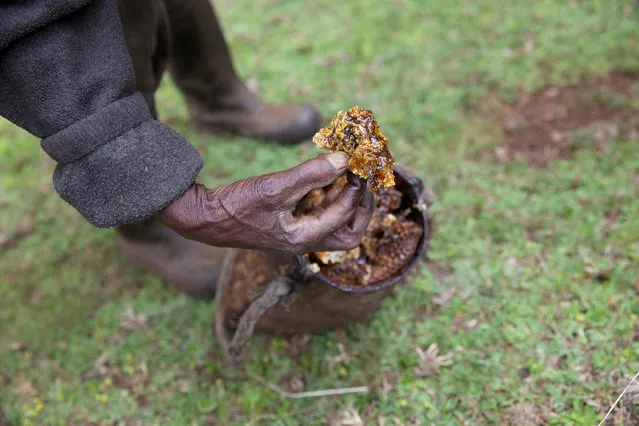
A man from the Ogiek community harvests honey in Mount Elgon game reserve, where they have reached an agreement with the government allowing them to remain in their ancestral lands in western Kenya, April 26, 2016. (Photo by Katy Migiro/Reuters)
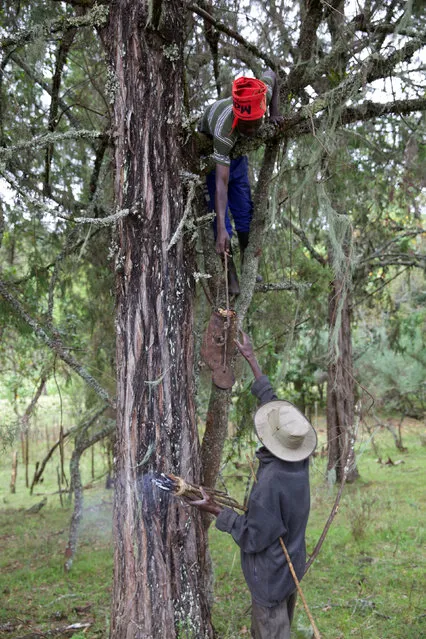
Men from the Ogiek community harvest honey in Mount Elgon game reserve, where they have reached an agreement with the government allowing them to remain in their ancestral lands in western Kenya, April 26, 2016. (Photo by Katy Migiro/Reuters)
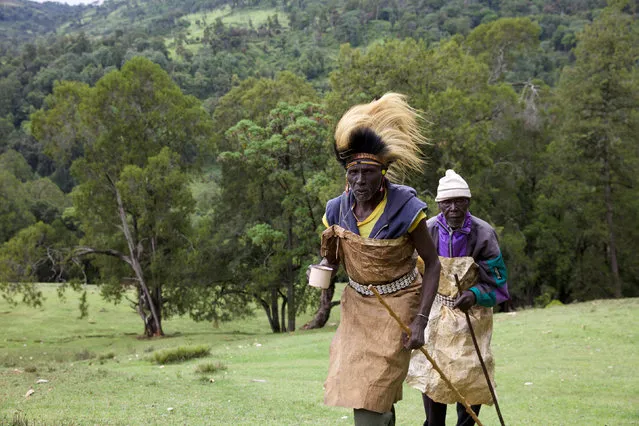
Kenyan men from the Sengwer community protest over their eviction from their ancestral lands, Embobut Forest, by the government for forest conservation in western Kenya, April 19, 2016. (Photo by Katy Migiro/Reuters)
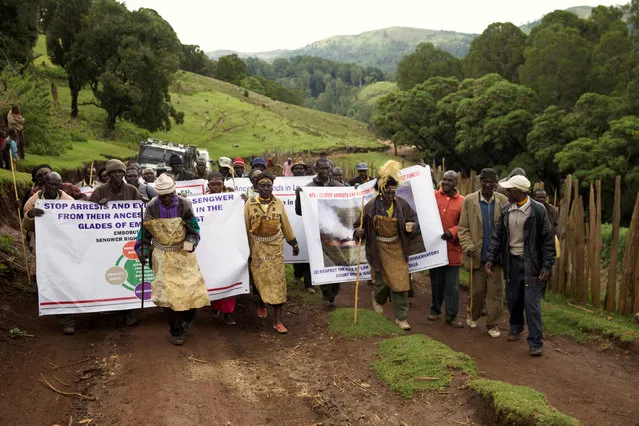
People from the Sengwer community protest over their eviction from their ancestral lands, Embobut Forest, by the government for forest conservation in western Kenya, April 19, 2016. (Photo by Katy Migiro/Reuters)
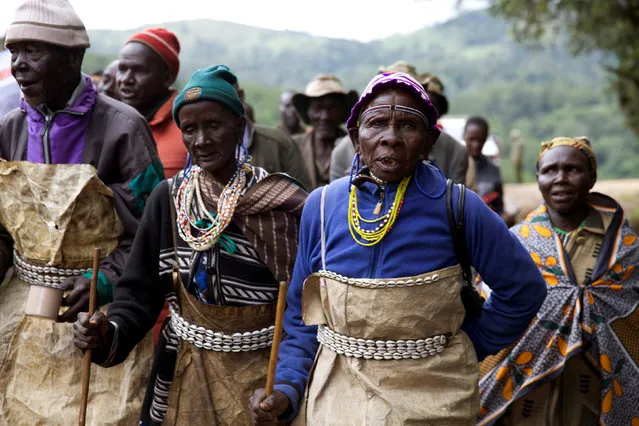
People from the Sengwer community protest over their eviction from their ancestral lands, Embobut Forest, by the government for forest conservation in western Kenya, April 19, 2016. (Photo by Katy Migiro/Reuters)
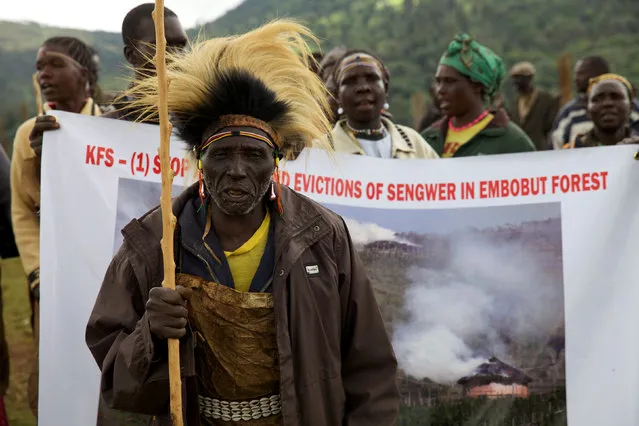
People from the Sengwer community protest over their eviction from their ancestral lands, Embobut Forest, by the government for forest conservation in western Kenya, April 19, 2016. (Photo by Katy Migiro/Reuters)
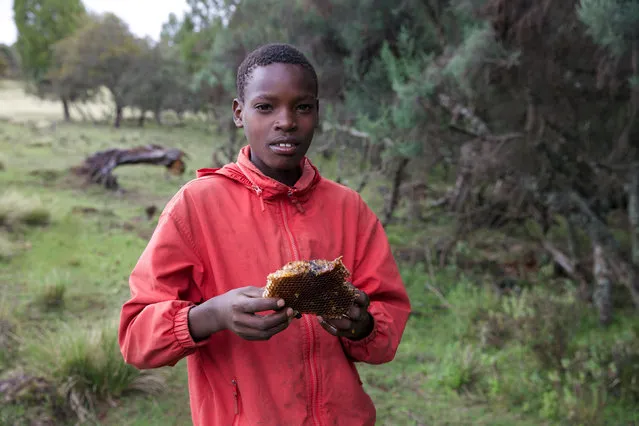
A boy from the Ogiek community harvests honey in Mount Elgon game reserve, where they have reached an agreement with the government allowing them to remain in their ancestral lands in western Kenya, April 26, 2016. (Photo by Katy Migiro/Reuters)
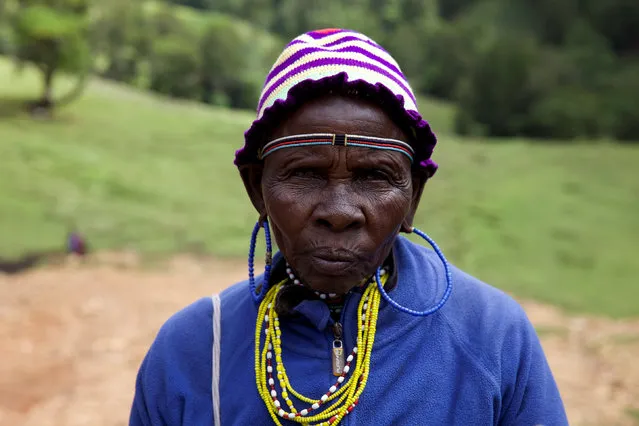
A woman from the Sengwer community poses for a photograph after protesting over their eviction from their ancestral lands, Embobut Forest, by the government for forest conservation in western Kenya, April 19, 2016. (Photo by Katy Migiro/Reuters)
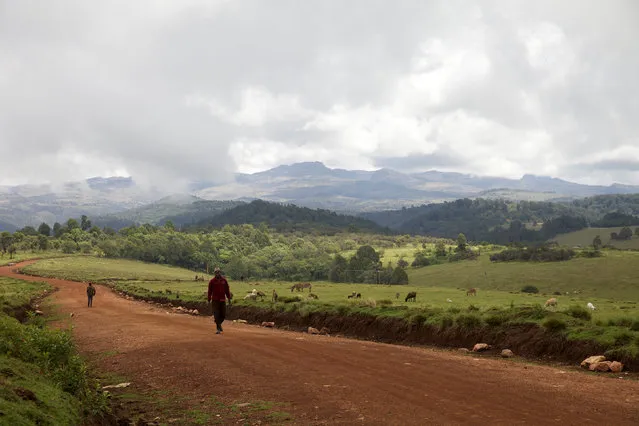
Men from the Ogiek community walk along the road after harvesting honey in Mount Elgon game reserve, where they have reached an agreement with the government allowing them to remain in their ancestral lands in western Kenya, April 26, 2016. (Photo by Katy Migiro/Reuters)
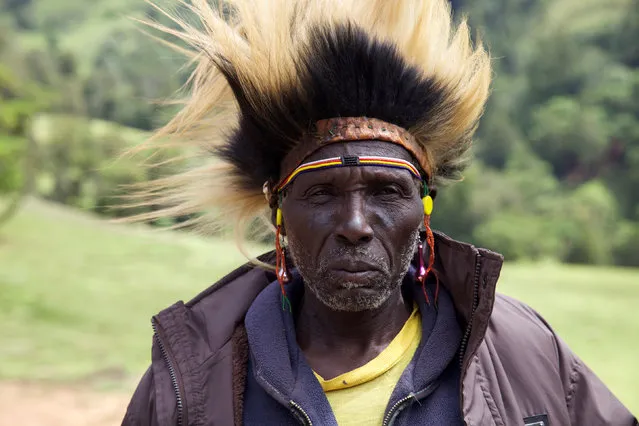
A man from the Sengwer community poses for a photograph after protesting over their eviction from their ancestral lands, Embobut Forest, by the government for forest conservation in western Kenya, April 19, 2016. (Photo by Katy Migiro/Reuters)
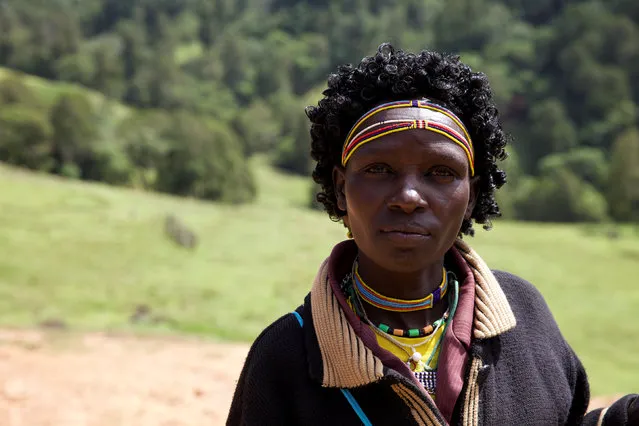
A woman from the Sengwer community poses for a photograph after protesting over their eviction from their ancestral lands, Embobut Forest, by the government for forest conservation in western Kenya, April 19, 2016. (Photo by Katy Migiro/Reuters)
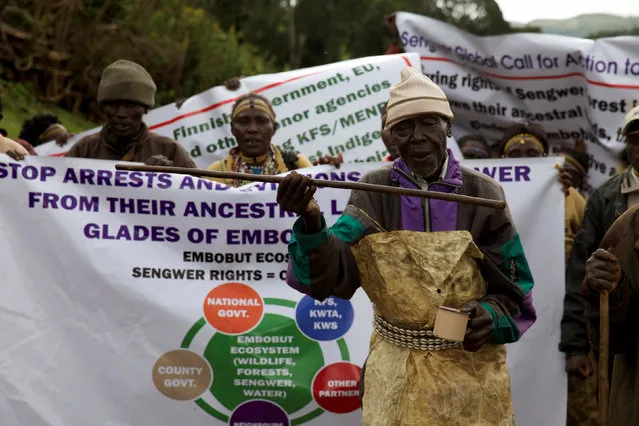
People from the Sengwer community protest over their eviction from their ancestral lands, Embobut Forest, by the government for forest conservation in western Kenya, April 19, 2016. (Photo by Katy Migiro/Reuters)
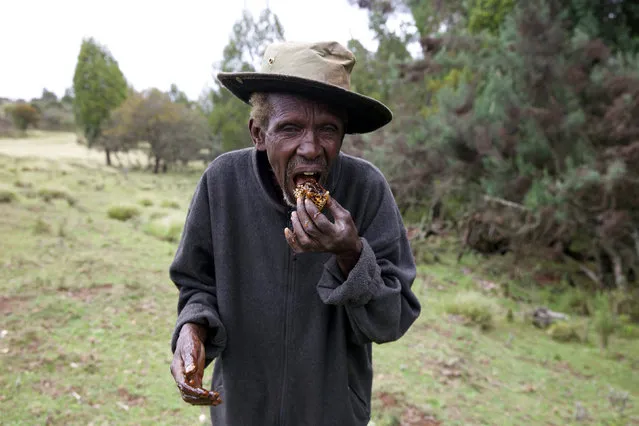
A man from KenyaÕs Ogiek community harvest honey in Mount Elgon game reserve, where they have reached an agreement with the government allowing them to remain in their ancestral lands in western Kenya April 26, 2016. (Photo by Katy Migiro/Reuters)
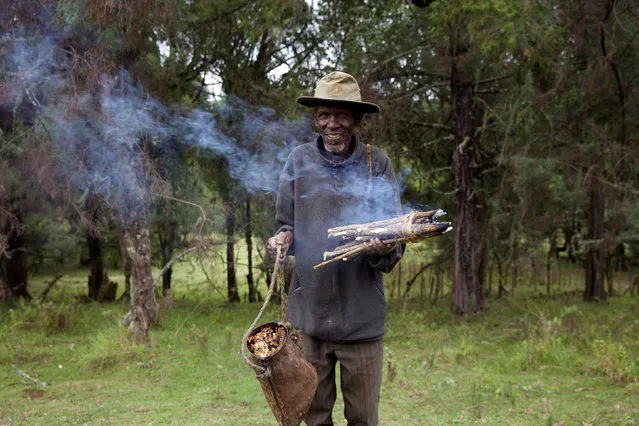
A man from Ogiek community harvests honey in Mount Elgon game reserve, where they have reached an agreement with the government allowing them to remain in their ancestral lands in western Kenya, April 26, 2016. (Photo by Katy Migiro/Reuters)
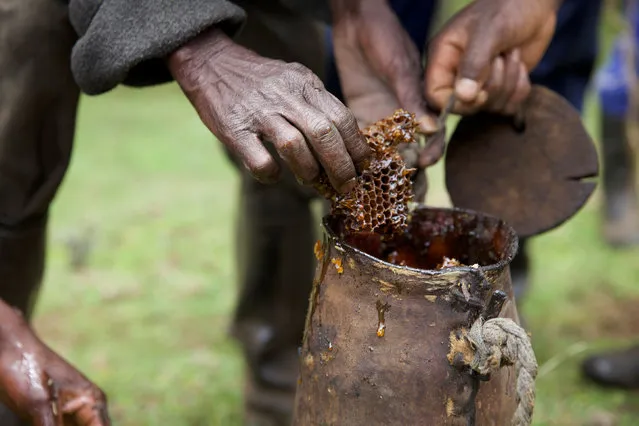
A man from the Ogiek community harvests honey in Mount Elgon game reserve, where they have reached an agreement with the government allowing them to remain in their ancestral lands in western Kenya, April 26, 2016. (Photo by Katy Migiro/Reuters)

A man from the Ogiek community harvests honey in Mount Elgon game reserve, where they have reached an agreement with the government allowing them to remain in their ancestral lands in western Kenya, April 26, 2016. (Photo by Katy Migiro/Reuters)

Men from the Ogiek community harvest honey in Mount Elgon game reserve, where they have reached an agreement with the government allowing them to remain in their ancestral lands in western Kenya, April 26, 2016. (Photo by Katy Migiro/Reuters)

Kenyan men from the Sengwer community protest over their eviction from their ancestral lands, Embobut Forest, by the government for forest conservation in western Kenya, April 19, 2016. (Photo by Katy Migiro/Reuters)

People from the Sengwer community protest over their eviction from their ancestral lands, Embobut Forest, by the government for forest conservation in western Kenya, April 19, 2016. (Photo by Katy Migiro/Reuters)

People from the Sengwer community protest over their eviction from their ancestral lands, Embobut Forest, by the government for forest conservation in western Kenya, April 19, 2016. (Photo by Katy Migiro/Reuters)

People from the Sengwer community protest over their eviction from their ancestral lands, Embobut Forest, by the government for forest conservation in western Kenya, April 19, 2016. (Photo by Katy Migiro/Reuters)

A boy from the Ogiek community harvests honey in Mount Elgon game reserve, where they have reached an agreement with the government allowing them to remain in their ancestral lands in western Kenya, April 26, 2016. (Photo by Katy Migiro/Reuters)

A woman from the Sengwer community poses for a photograph after protesting over their eviction from their ancestral lands, Embobut Forest, by the government for forest conservation in western Kenya, April 19, 2016. (Photo by Katy Migiro/Reuters)

Men from the Ogiek community walk along the road after harvesting honey in Mount Elgon game reserve, where they have reached an agreement with the government allowing them to remain in their ancestral lands in western Kenya, April 26, 2016. (Photo by Katy Migiro/Reuters)

A man from the Sengwer community poses for a photograph after protesting over their eviction from their ancestral lands, Embobut Forest, by the government for forest conservation in western Kenya, April 19, 2016. (Photo by Katy Migiro/Reuters)

A woman from the Sengwer community poses for a photograph after protesting over their eviction from their ancestral lands, Embobut Forest, by the government for forest conservation in western Kenya, April 19, 2016. (Photo by Katy Migiro/Reuters)

People from the Sengwer community protest over their eviction from their ancestral lands, Embobut Forest, by the government for forest conservation in western Kenya, April 19, 2016. (Photo by Katy Migiro/Reuters)

A man from KenyaÕs Ogiek community harvest honey in Mount Elgon game reserve, where they have reached an agreement with the government allowing them to remain in their ancestral lands in western Kenya April 26, 2016. (Photo by Katy Migiro/Reuters)

A man from Ogiek community harvests honey in Mount Elgon game reserve, where they have reached an agreement with the government allowing them to remain in their ancestral lands in western Kenya, April 26, 2016. (Photo by Katy Migiro/Reuters)

A man from the Ogiek community harvests honey in Mount Elgon game reserve, where they have reached an agreement with the government allowing them to remain in their ancestral lands in western Kenya, April 26, 2016. (Photo by Katy Migiro/Reuters)
20 May 2016 12:51:00,
post received
0 comments
